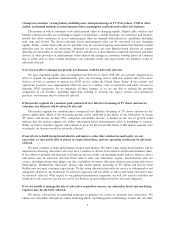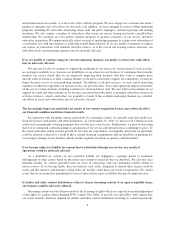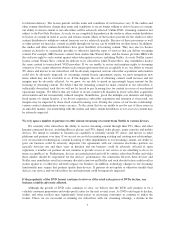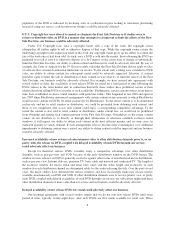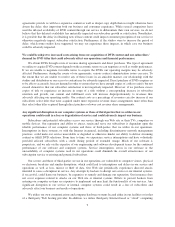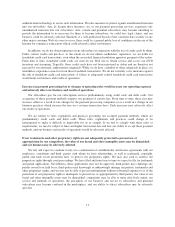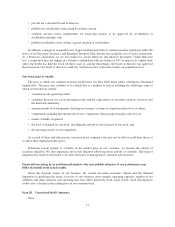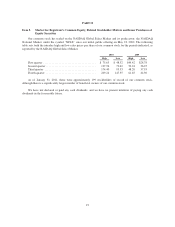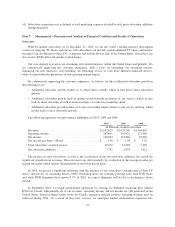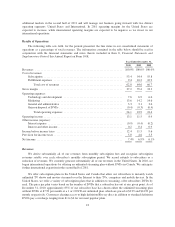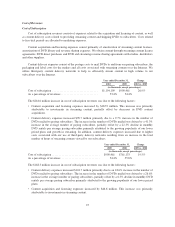NetFlix 2010 Annual Report Download - page 17
Download and view the complete annual report
Please find page 17 of the 2010 NetFlix annual report below. You can navigate through the pages in the report by either clicking on the pages listed below, or by using the keyword search tool below to find specific information within the annual report.Most of these matters relate to patent infringement lawsuits, which are typically expensive to defend. Litigation
disputes could cause us to incur unforeseen expenses, could occupy a significant amount of our management’s
time and attention and could negatively affect our business operations and financial position.
We could be subject to economic, political, regulatory and other risks arising from our international
operations.
In September 2010, we began international operations by offering an unlimited streaming plan without
DVDs in Canada and we anticipate further international expansion. Operating in international markets requires
significant resources and management attention and will subject us to regulatory, economic and political risks
that are different from and incremental to those in the United States. In addition to the risks that we face in the
United States our international operations involve risks that could adversely affect our business, including:
• the need to adapt our content and user interfaces for specific cultural and language differences;
• difficulties and costs associated with staffing and managing foreign operations;
• management distraction;
• political or social unrest and economic instability;
• compliance with U.S. laws such as the Foreign Corrupt Practices Act, and local laws prohibiting corrupt
payments to government officials;
• difficulties in understanding and complying with local laws, regulations and customs in foreign
jurisdictions;
• unexpected changes in regulatory requirements;
• less favorable foreign intellectual property laws;
• adverse tax consequences;
• fluctuations in currency exchange rates, which could impact revenues and expenses of our international
operations and expose us to foreign currency exchange rate risk;
• profit repatriation and other restrictions on the transfer of funds;
• new and different sources of competition;
• different and more stringent user protection, data protection, privacy and other laws; and
• availability of reliable broadband connectivity and wide area networks in targeted areas for expansion.
Our failure to manage any of these risks successfully could harm our future international operations and our
overall business, and results of our operations.
We may seek additional capital that may result in stockholder dilution or that may have rights senior to
those of our common stockholders.
From time to time, we may seek to obtain additional capital, either through equity, equity-linked or debt
securities. The decision to obtain additional capital will depend, among other things, on our development efforts,
business plans, operating performance and condition of the capital markets. If we raise additional funds through
the issuance of equity, equity-linked or debt securities, those securities may have rights, preferences or privileges
senior to the rights of our common stock, and our stockholders may experience dilution.
We issued $200 million in a debt offering and may incur additional debt in the future, which may
adversely affect our financial condition and future financial results.
As of December 31, 2010, we have $200 million in 8.50% senior notes outstanding. Risks relating to our
long-term indebtedness include:
• Requiring us to dedicate a portion of our cash flow from operations to payments on our indebtedness,
thereby reducing the availability of cash flow to fund working capital, capital expenditures, acquisitions
and investments and other general corporate purposes;
15


